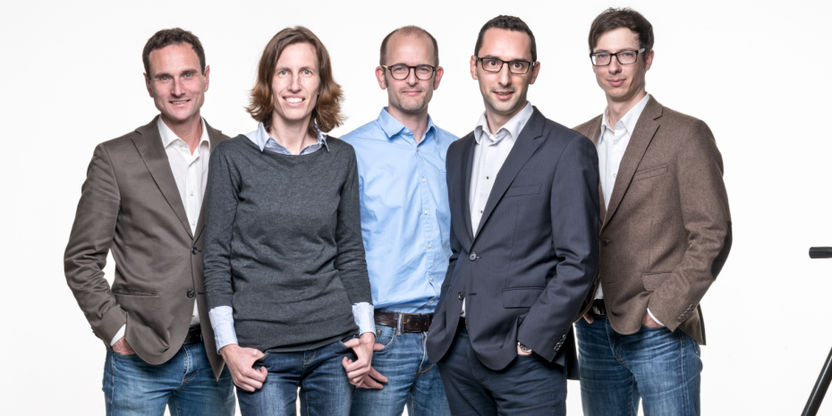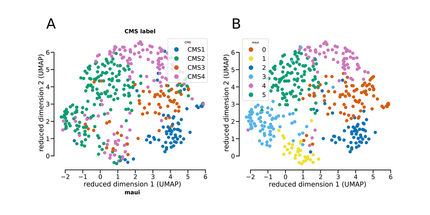Using algorithms to track down cancer
Modern medicine is looking for markers that provide early warning of complex diseases. In its quest to discover these “biomarkers”, the ETH spinoff Scailyte has developed software capable of analysing millions of single cells very efficiently.

CEO Peter Nestorov's (2nd from right) company now employs over 20 people
ETH Zürich / Scailyte
The search for biomarkers is currently one of the biggest challenges of modern medicine. One of the goals, for example, is for patients to be able to take a blood test to check whether they may have a disease, before the first symptoms make themselves known. If this were possible, patients could receive targeted treatment and in many cases even be cured. However, science is still grappling with the early detection of cancer and other complex diseases.
This is where the ETH spinoff Scailyte comes in. “Our algorithms analyse millions of single cells and identify patterns that point to specific diseases,” says Peter Nestorov, CEO of Scailyte. He uses a metaphor to explain how the software works: “Imagine a fruit salad that tastes bad. Instead of trying to guess what the cause of the problem is by looking at the colour or the smell, we isolate every single component and analyse each one.” The start-up plans to use this method to track down cancer and other complex diseases. The aim is “to improve and save lives”, according to Scailyte’s corporate vision.
Efficiency is one of the key strengths of Scailyte’s software. While it would take several weeks to churn through the massive amounts of data using conventional methods, the software developed by the start-up is powered by artificial intelligence and can complete this task in a few days. This is because the software can learn from data already processed and on this basis identifies abnormal cells associated with certain diseases. This method was developed and scientifically validated at ETH. The underlying algorithms were developed by Manfred Claassen, Professor for Computational Biology at ETH Zurich and his doctoral student, Eirini Arvaniti.
Alongside the decoding of DNA 50 years ago, single cell technology represents one of the biggest breakthroughs in biomedicine. Within the scientific community, extensive basic research is currently being conducted in this field. Scailyte’s first step is therefore to bring its software to market for researchers to use – revenues should start to flow this autumn. But basic scientific research seldom leads directly to practical use in medicine. Scailyte wants to fill this gap in the mid-term. “Over the coming years we want to standardise the software and offer it for clinical applications,” Nestorov says. Services in the field of data analytics will also be part of the business model.
With a view to eventually delivering practical applications, Scailyte has already launched several projects in conjunction with various partners. Working with University Hospital of Zurich and the Inselspital university hospital in Bern, for example, the search is on for biomarkers for cancer – with some encouraging initial results already: “We have already identified certain characteristics,” Nestorov says. Research work is still being conducted on the premises of the project partners at present, but Nestorov says they hope to move into their own laboratory soon.
Data analytics for innovative technology
The idea for Scailyte came to Nestorov while working for Witec AG, a company that sells laboratory equipment for isolating cells, amongst other things. Originally from Bulgaria, the 35-year-old scientist studied biochemistry in Germany and completed his doctorate in genetics at Basel university, specializing in genetics and establishing single-cell methods. “Customers were constantly telling me how they were struggling with data analytics,” Nestorov recalls. “So the time was ripe to set up a company.” He approached ETH Professor Manfred Claassen as well as the two software and IT specialists, Dennis Göhlsdorf and Daniel Sonnleithner, both former members of ETH Zurich. In 2017 the four founded Scailyte AG. It was Göhlsdorf who refined the academic prototype for the software to make it market ready.
Over 20 people currently work for Scailyte. Only a few are based in the company’s head office in Sursee – most work abroad or in the labs of project partners. Investors provide the financing for the young business. Last December the company raised 2.7 million Swiss francs of risk capital, with Swisscom Ventures acting as main investor. Another major financing round is planned for the summer of 2020 to fund the company’s expansion, when it hopes to raise between 20 and 40 million francs.
Whereas Scailyte is one of the pioneers in data analysis with single cells in Europe, competition is much tougher in the USA. But the start-up’s focus on clinical diagnostics sets it clearly apart from American competition. Its plans are equally ambitious: “We want to further develop our software and our approach to exploring biomarkers based on single-cell analysis so we can offer it on a global scale,” says Nestorov.
Other news from the department research and development
These products might interest you
Most read news
More news from our other portals
Something is happening in the life science industry ...
This is what true pioneering spirit looks like: Plenty of innovative start-ups are bringing fresh ideas, lifeblood and entrepreneurial spirit to change tomorrow's world for the better. Immerse yourself in the world of these young companies and take the opportunity to get in touch with the founders.
See the theme worlds for related content
Topic World Cell Analysis
Cell analyse advanced method allows us to explore and understand cells in their many facets. From single cell analysis to flow cytometry and imaging technology, cell analysis provides us with valuable insights into the structure, function and interaction of cells. Whether in medicine, biological research or pharmacology, cell analysis is revolutionizing our understanding of disease, development and treatment options.

Topic World Cell Analysis
Cell analyse advanced method allows us to explore and understand cells in their many facets. From single cell analysis to flow cytometry and imaging technology, cell analysis provides us with valuable insights into the structure, function and interaction of cells. Whether in medicine, biological research or pharmacology, cell analysis is revolutionizing our understanding of disease, development and treatment options.


























































